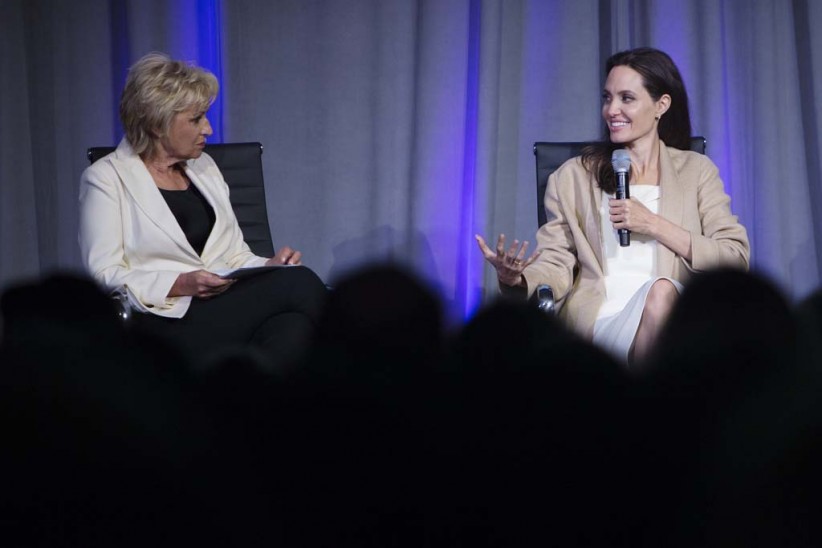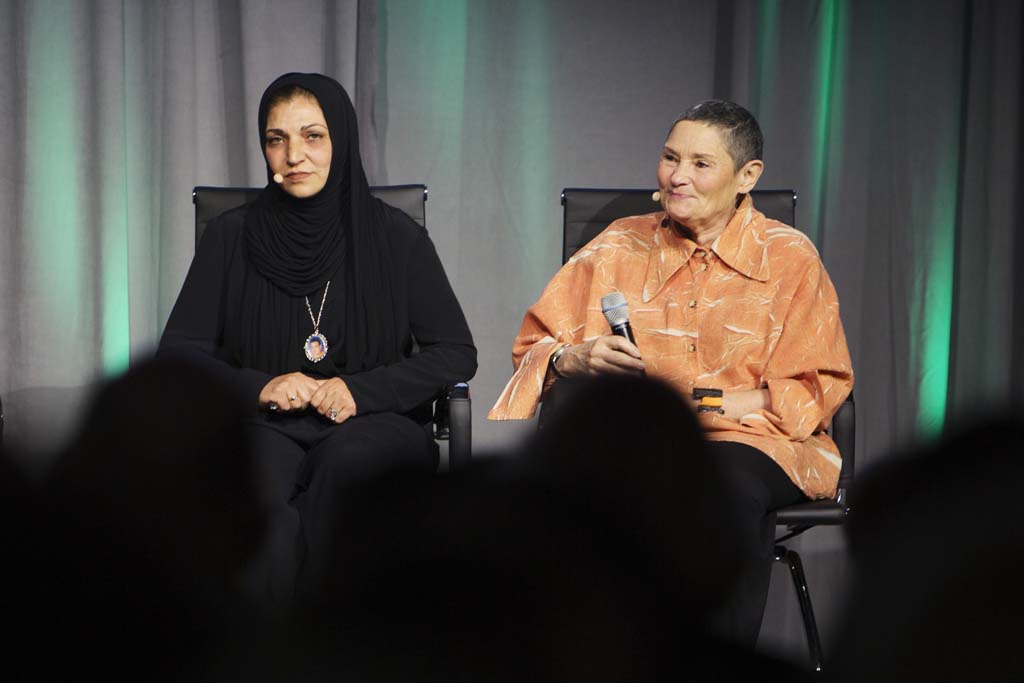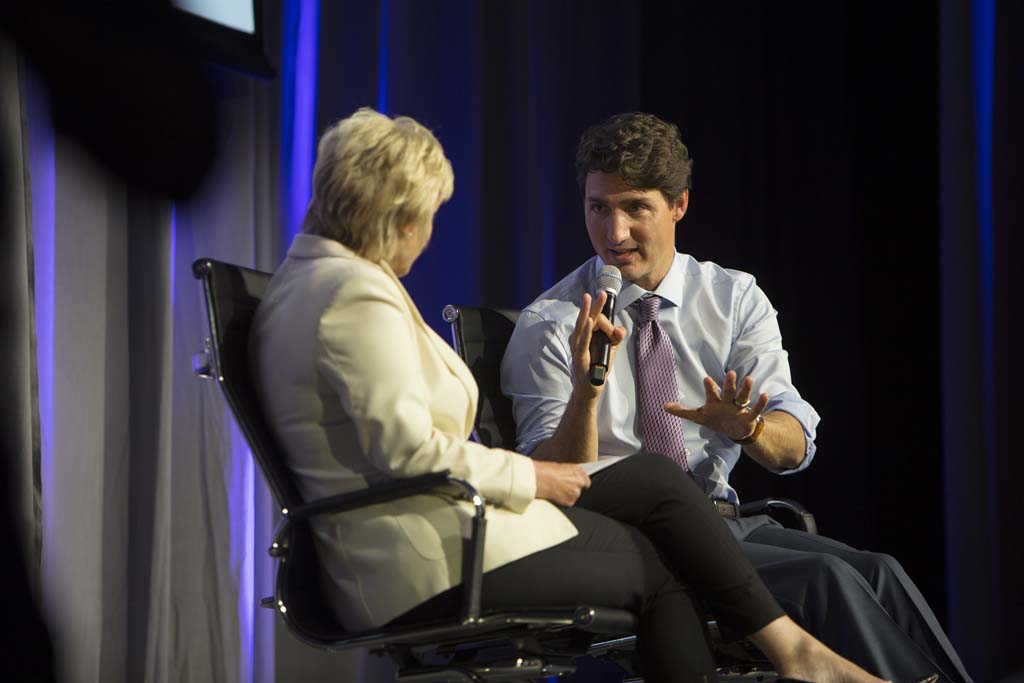Women in the real world, not Angelina Jolie, give meaning to summit
Anne Kingston: Marquee names at Women in the World do what host Tina Brown’s celebrity magazine covers once did: make you buy the issue so you’ll read the more interesting stories inside
Tina Brown, Founder and CEO, Tina Brown Live Media/Women in the World opens the Women in the World Canada Summit in Toronto. (Photograph by Della Rollins)
Share

On the 16th anniversary of 9/11, Tina Brown brought her highly successful, corporate-branded, feminist Coachella—“The Women in the World Summit”—to Toronto for a day-long event. The former Vanity Fair and New Yorker editor always rustles up marquee names, and did so Monday, with a list that included Prime Minister Justin Trudeau, Sophie Grégoire Trudeau, Angelina Jolie, Minister of Foreign Affairs Chrystia Freeland and historian Margaret MacMillan.
The most compelling voices, however, were not the most famous, but the most blunt and defiant. Just as Brown helped created a celebrity caste pre-9/11 at Vanity Fair and Talk magazine, she has identified a new celebrity iteration: activists responding to a world on fire. It’s not movie stars, no matter how crusading, that now warrant listening. It’s those in the field gathering facts or people who work on the front lines identifying and fighting injustice, inequity and hate. Felicia Sanders, who watched her 26-year-old son, Tywanza Sanders, and eight others shot dead by white supremacist Dylann Roof at the Emanuel AME Church in Charleston in 2015, spoke of joining a new church with white members: “The congregation does not look like me but I am welcome,” she said. “I refuse to be afraid of 20-year-old white boys.”
Masih Alinejad, an exuberant Iranian-born journalist, ignored her interviewer as she outlined how she defied the law in her country in 2014 by posting photographs of herself without her hijab—spurring thousands to do the same. “The hijab is not a piece of cloth,” she said. “I’m talking about the man behind it who tells me what to wear; I’m talking about my dignity and my identity.” She spoke of being joined by women who believed in the hijab—”We are all for freedom of choice”—and glossed over being arrested and jailed. Robi Damelin, an Israeli, and Bushra Awad, a Palestinian, who share the tragedy of having sons killed in conflict, spoke of forming the Parents Circle-Family Forum, with more than 600 bereaved families united in grief and desire for reconciliation. “Recognizing the humanity in the other is the beginning of the end of conflict,” Damelin said.
READ MORE: Photos from the Women in the World summit
Inspiring, yes. But also a snapshot of a world in distress, one at seeming disconnect from the comfortable auditorium filled with women sipping on bottled water supplied by a corporate sponsor. Oddly, there was no mention of 9/11, and how its legacy affected women around the world. The power of motherhood, that unassailable topic, as well as the need to mobilize en masse were repeated themes.
RELATED: Why a fancy, feel-good women’s summit is what the world needed
Concerning statistics dropped throughout the day. On the panel “Fighting Hate in the U.S.,” Heidi Beirich, director of the Intelligence Project at the Southern Poverty Law Center, spoke of unprecedented acts of domestic terrorism every 34 days—and that there are more than 900 hate groups in the U.S., up one-third from 20 years ago. Journalist Kara Switzer noted that women raised $1.5 billion in venture capital in the U.S. versus the $50 billion raised by men. “First of all, have you met a venture capitalist?” she asked the crowd. “They’re all white men in khakis. They think it’s a meritocracy, but it’s a mirror-tocracy.” Madonna Badger, who runs a New York City-based advertising agency, and designed the #WomenNotObject campaign to combat rampant sexism in advertising, drew gasps with her comment that one out of four girls under seven had been on a diet, with girls saying they’d rather have cancer than be fat.
How these topics connect—and of course they do—was beyond the timeframe of the half-hour panels. Audience members had to connect the dots. Such constraints also meant no opportunity to follow-up on statements that demanded it. Carolyn Tastad, group president of P&G North America, a Women in the World sponsor proclaimed “Most people think companies can change the world more than governments,” without explaining how. Chrystia Freeland talked about adding “an Indigenous chapter” to NAFTA like the “gender chapter” that the government included in the trade agreement with Chile. “Our relationship with Indigenous people is Canada’s original sin,” she said.

Over five hours of panels and interviews, it became clear that marquee names functioned much as Brown’s Vanity Fair‘s celebrity covers once did: to make you buy the magazine so you’ll read the more interesting stories inside. The cover story Monday was Justin Trudeau, also a headliner at Brown’s three-day Women in the World Summit in New York City last April. “We came to see Justin Trudeau’s Canada the way our grandmothers came to see Niagara Falls,” Brown told the predominantly female crowd, before running a video of Trudeau’s collected “I am feminist, hear me roar” moments. “You never miss an opportunity to call yourself a feminist,” Brown said to Trudeau, one of many remarks she made to him that could be read as gush or sarcasm. Trudeau, in his signature shirt-sleeves, delivered a now-familiar performance filled with crowd-pleasing platitudes—how gender equality and empowerment is “not about doing the right thing but the smart thing;” how his wife inspires and challenges him: “I am uplifted by opportunity to work alongside her as we work for a better world.” His wife was not his “wife,” Trudeau explained, but his “partner.”
Brown asked Trudeau whether he’d give up his job to stay home. “Probably not this job,” the Prime Minister joked, evoking predictable laughter. Domestic sacrifices were made for his political career, he said. His wife wanted to take the family to see the world in a sailboat, while home schooling the children.
RELATED: Is Justin Trudeau a fake feminist?
Trudeau also praised German chancellor Angela Merkel as “absolutely amazing” and a “good friend,” after saying he had to be careful given that Germany is in an election campaign. “I will work with whoever gets elected,” he said, adding, “That’s a line I have used a few times,” a reference to his comment about Donald Trump. On cue, the crowd laughed.
When Brown asked about using “incentives” to achieve gender equality, as in quotas or legislation, Trudeau went vague, focusing instead on “highlighting businesses who have success.” Brown turned to “savage online abuse” being a factor in poor retention of female politicians, mentioning Christy Clark. She asked the Prime Minister if he would pass legislation to “end the Wild West of misogyny on the Internet.” Again, Trudeau deflected. “Yes, we need to end the Wild West of misogyny on the Internet,” he repeated, avoiding any mention of legislation.
Brown also failed to get a response from the PM about the troubled National Inquiry into Missing and Murdered Indigenous Women, when she asked how it became “beleaguered.” Trudeau again bobbed and weaved. He spoke of healing and “putting an end to injustice.” Many in Indigenous communities have told him this is the “right start,” Trudeau told Brown, adding: “It’s a hard thing, it’s not an easy thing. It’s a thing we’re definitely on the right path for.”
Brown, a sharp interviewer, skipped obvious follow-ups. She’s not there to skewer but inspire. As Trudeau walked down the stairs into the audience, taking photos with corporate sponsors (the event was free) who occupied the front rows, Brown marvelled that most leaders would never descend into a crowd like that.

The Canada love-in continued as author Zainab Salbi interviewed Chrystia Freeland and Margaret MacMillan. When Salbi enthused, “Canada is like a shining star in the world,” Freeland shot her down: “There’s nothing magical about Canada or Canadians, but liberal democracy is not looking so robust.” The conversation that followed focused on the threat from within without time to drill into specifics.
Unsurprisingly, Russia came up, with MacMillan and Freeland agreeing that Putin crossed the line with his annexation of Crimea. “Putin is playing a weak hand,” MacMillan said. Freeland nodded. “Our economy is bigger than Russia’s…though the world does not tremble at our economic might.”
RELATED: Justin Trudeau takes his greatest feminist hits to Broadway
When Salbi asked Freeland about Trump’s recent tweet that Canada and Mexico were “being very difficult” at the NAFTA negotiating table, the minister responded as if she were dealing with a rational president. Canada had the best trade negotiators in world, she said; they’d done their homework and are acting in good faith to find agreement: “We are polite, but being polite doesn’t mean you can’t be strong.”
When asked if more women in leadership will “help,” MacMillan answered the only way the question can be: “I don’t know, depends on the woman.”
Up next was Angelina Jolie, not to discuss current events but her new movie, First They Killed My Father, set in Cambodia during the rule of the Khmer Rouge, premiering that night at TIFF. She was accompanied by her co-writer, Cambodian writer Loung Ung, whose 2000 memoir about surviving the Pol Pot regime as a child inspired the movie. Jolie spoke thoughtfully of filming in Cambodia, having a therapist on set for the Cambodian crew traumatized by reliving the subject matter, and answered the inevitable questions about travelling the world with her children. Yet Ung’s story was the far more compelling—the dislocation she experienced, the horrors she witnessed, her sense of betrayal as a child that was shunned by her mother sending her away, later replaced with recognition of the sacrifice she made. Ung spoke of how she had to “live in my body as a girl” to avoid land mines. “I was so grateful that I left with all of my limbs,” she said, explaining that children have to have such amputations sawed down regularly as the bones continue to grow.
That panel, followed by one about female objectification in advertising, couldn’t help create a whipsaw effect, veering from little girls in Cambodia avoiding land mines to little girls in the Western world with eating disorders avoiding food. The panel also provided more proof, as if it’s needed, that female objectification in ads is as bad, if not worse, than it’s ever been: A recent perfume ad showing three naked women was projected next to an ad from the ’50s with a drawing of a naked woman sitting on cigarette case. P&G’s Tastad rhymed off worrisome stats—that girls’ confidence drops off at the time of their first period, that more than 50 per cent were paralyzed with a sense of failure and 70 per cent were afraid to try something new. The panel, which included Sophie Grégoire Trudeau, didn’t have time to plumb reasons, or critique the role played by advertising itself. Nor was increasing male objectification, as seen in swooning over the country’s PM, mentioned. Instead, Tastad outlined how empowerment marketing of a P&G sanitary product was intended to change attitudes.
Grégoire Trudeau dominated the discussion with an extended riff that began with her experience with eating disorders and segued into humanity and the need for creativity. “The price of hurting the womb of humanity is a high price for everyone—women and men,” she said, before referencing her husband’s teaching career and a question he’d ask his class about being artistic. Finally, moderator Wendy Mesley had to intervene to move the conversation along. Badger, whose groundbreaking work inspired the panel, was given mere minutes to speak.
Far more successful was the last panel, “Women Busting Up the Bro Culture,” which delved into confronting systematic sexism with women who see it every day: lawyer Lisa Bloom, who represented women who worked at Fox News whose accusations against Bill O’Reilly of assault and harassment got him fired; journalist Kara Switzer, who covers Silicon Valley; and Tamika D. Mallory, co-chair of the Women’s March, which saw five million demonstrate worldwide.
All agreed “bro culture” doesn’t describe what’s going on. “It’s fun and light, like ‘bromance,’ ” Bloom said. “I would call it systemic misogyny.” Women prop it up, too, says Mallory, who is black. She called out white women for voting for Trump: “Help me understand,” she pleaded. “Forget that he’s sexist. You had an opportunity to put a very qualified woman in the position and we dropped the ball. Ninety-four percent of black women voted for Hillary, so we obviously don’t have the problem.” Bloom quickly served up an answer: “Racism.” (It was one of the day’s few references to Trump. Another came from Felicia Saunders, who’d lost her son to racial hate: “I respect the president because he is the president,” she said, “but in God’s own time I think he’s going to be dealt with.”)
The final panel finally gave room to vent anger, contrary to the way women are raised. Switzer recalled writing a story about Twitter’s IPO in which she recounted a company joke “that Twitter’s governing body has to expand beyond ‘three Peters and a Dick.’ ” Men called her out on it, she told the audience: “They said, ‘Kara, that’s so offensive’. I’d say, ‘Yeah, f–k you.’ ”
Bloom advised any women who had been harassed to consider litigation as a “powerful weapon.” She looked out at the affluent room: “If you have financial security, and are at a certain place, you have to stand up. When our time comes, we have to stand up.” She alluded to the previous panel about fighting hate crimes populated by people who’d lost loved ones. “If they can do what they do, we can stand up to sexual harassment.” It was the fitting rallying cry to end a day that revelled in feel-good inspiration that, in the end, means nothing without action.